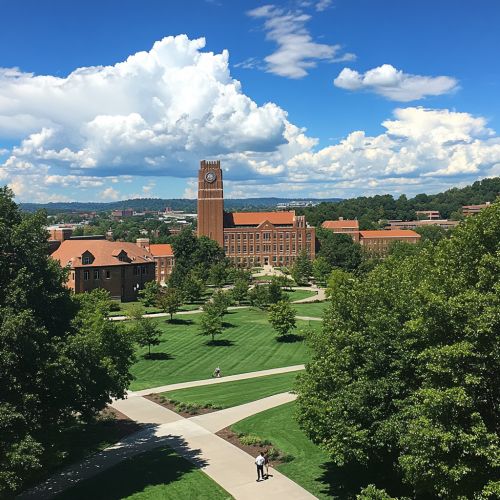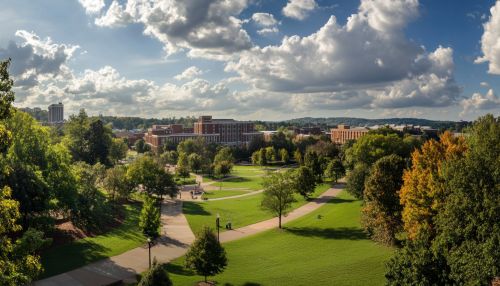University of Tennessee, Knoxville: Difference between revisions
(Created page with "== History == The University of Tennessee, Knoxville (UTK) is a public research university located in Knoxville, Tennessee. Established in 1794, it is the flagship institution of the University of Tennessee system. The university's origins can be traced back to Blount College, named after territorial governor William Blount. The college was chartered two years before Tennessee became the 16th state, making it one of the oldest public universities in the United State...") |
No edit summary |
||
| (One intermediate revision by the same user not shown) | |||
| Line 13: | Line 13: | ||
The campus is divided into several distinct areas, including the Hill, where many of the oldest buildings are located, and the newer sections that house state-of-the-art research facilities. The John C. Hodges Library, one of the largest libraries in the Southeastern United States, is a central hub for students and researchers. | The campus is divided into several distinct areas, including the Hill, where many of the oldest buildings are located, and the newer sections that house state-of-the-art research facilities. The John C. Hodges Library, one of the largest libraries in the Southeastern United States, is a central hub for students and researchers. | ||
[[Image:Detail-98375.jpg|thumb|center|A panoramic view of the University of Tennessee, Knoxville campus, featuring Ayres Hall and surrounding greenery.|class=only_on_mobile]] | |||
[[Image:Detail-98376.jpg|thumb|center|A panoramic view of the University of Tennessee, Knoxville campus, featuring Ayres Hall and surrounding greenery.|class=only_on_desktop]] | |||
== Academics == | == Academics == | ||
Latest revision as of 08:52, 11 October 2024
History
The University of Tennessee, Knoxville (UTK) is a public research university located in Knoxville, Tennessee. Established in 1794, it is the flagship institution of the University of Tennessee system. The university's origins can be traced back to Blount College, named after territorial governor William Blount. The college was chartered two years before Tennessee became the 16th state, making it one of the oldest public universities in the United States.
In 1807, Blount College was renamed East Tennessee College, and in 1826, it relocated to its current location on a hilltop overlooking the Tennessee River. The institution underwent another name change in 1840, becoming East Tennessee University. During the American Civil War, the university's campus was occupied by both Confederate and Union forces, which led to significant damage and disruption.
In 1879, the institution was designated as the University of Tennessee, reflecting its status as a land-grant university under the Morrill Act of 1862. This designation marked a turning point, allowing the university to expand its academic offerings and infrastructure significantly.
Campus
The University of Tennessee, Knoxville, spans over 910 acres and features a blend of historic and modern architecture. The campus is noted for its picturesque setting, with the Tennessee River to the south and the Great Smoky Mountains visible in the distance. Key landmarks include Ayres Hall, a prominent Gothic Revival building that serves as an iconic symbol of the university.
The campus is divided into several distinct areas, including the Hill, where many of the oldest buildings are located, and the newer sections that house state-of-the-art research facilities. The John C. Hodges Library, one of the largest libraries in the Southeastern United States, is a central hub for students and researchers.


Academics
UTK offers a comprehensive range of undergraduate, graduate, and professional programs across 11 colleges. It is classified as an R1: Doctoral University with very high research activity by the Carnegie Classification of Institutions of Higher Education. The university is renowned for its programs in engineering, business, law, and agriculture.
The Tickle College of Engineering is particularly notable for its research in areas such as materials science, nuclear engineering, and transportation. The Haslam College of Business is recognized for its supply chain management program, consistently ranked among the best in the nation.
UTK is also home to the Howard H. Baker Jr. Center for Public Policy, which promotes civic engagement and provides a platform for policy research and dialogue. The university's research initiatives are supported by partnerships with organizations such as Oak Ridge National Laboratory, enhancing its capabilities in fields like energy and environmental science.
Research and Innovation
Research at the University of Tennessee, Knoxville, is driven by a commitment to addressing global challenges through interdisciplinary collaboration. The university's research expenditures exceed $300 million annually, reflecting its role as a leader in innovation.
Key research areas include advanced materials, bioinformatics, and renewable energy. The Joint Institute for Advanced Materials (JIAM) is a testament to UTK's dedication to cutting-edge research, providing state-of-the-art facilities for scientists and engineers.
The university's partnership with Oak Ridge National Laboratory (ORNL) is a cornerstone of its research strategy. This collaboration has led to significant advancements in fields such as neutron science, computational biology, and cybersecurity. The Bredesen Center for Interdisciplinary Research and Graduate Education, a joint initiative with ORNL, offers unique doctoral programs that integrate science, engineering, and policy.
Student Life
Student life at UTK is vibrant and diverse, with over 400 student organizations catering to a wide range of interests. The university's location in Knoxville, a city known for its music, arts, and outdoor activities, provides students with ample opportunities for cultural and recreational engagement.
The Volunteer Spirit, a defining characteristic of the university, is embodied in the student body's commitment to community service and leadership. The Center for Leadership and Service coordinates numerous volunteer projects, encouraging students to make a positive impact locally and globally.
Athletics play a significant role in campus life, with the Tennessee Volunteers competing in the Southeastern Conference (SEC). Neyland Stadium, one of the largest stadiums in the United States, hosts the university's football games and is a focal point of school spirit.
Notable Alumni
The University of Tennessee, Knoxville, boasts a distinguished list of alumni who have made significant contributions across various fields. Notable alumni include Nobel laureate James M. Buchanan, Pulitzer Prize-winning author Cormac McCarthy, and former U.S. Senator Howard H. Baker Jr.
The university's alumni network is extensive, providing graduates with valuable connections and opportunities for professional development. The UTK Alumni Association plays a crucial role in fostering these connections, organizing events and initiatives that engage alumni worldwide.
